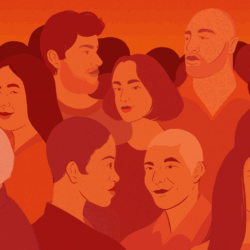With one in five women in Canada experiencing online harassment, and government regulation and corporate motivation lacking, philanthropy has a responsibility to fill the gap, writes the Canadian Women’s Foundation’s Andrea Gunraj.
Social media, messaging and dating apps, online co-working systems, gaming sites. Lines that had once separated digital life from offline life have long smudged away.
Especially with the catalyst of a global pandemic, the rise of digital work, play, relationships, and worship has meant all kinds of opportunities for collaboration and communication, all manner of new sites of inclusion.
It has meant more hate, harassment, and abuse of women, girls, and Two Spirit, trans, and non-binary people, too, especially those who face racism, ableism, and other forms of discrimination on top of gender discrimination. It has paradoxically opened new spaces in which they get silenced and pushed out.
One in five women in Canada experience online harassment. Young women, 2SLGBTQIA+ people, and racialized people are especially targeted. Women and gender-diverse people with public platforms who address gender justice matters – politicians, journalists, influencers – also find themselves under special attack.
It began at the very dawn of the internet’s mass popularity. From the 1990s to 2018, 76% of the complainants in cases of technology-facilitated violence reported to courts of appeal or the Supreme Court were female, and 91% of the accused were male.
It transcends borders, too. Synthesized survey results from 2018 onward show the prevalence of digital violence against women and girls at a rate of anywhere between 16 and 58%. The most common forms of this abuse include misinformation and defamation (67%), cyber harassment (66%), and hate speech (65%).
Women are most likely to leave digital spaces to protect their safety. As the Organization of American States puts it, the goal of this behaviour is indeed “to create a hostile online environment for women in order to shame, intimidate, denigrate, belittle, or silence them by means of surveillance, theft or manipulation of information, or control of their communication channels.”
The sheer commonplaceness of gendered digital hate and harassment has overwhelmed me. Effective action and policies to address and end it underwhelm me.
Andrea Gunraj
While I’ve had the privilege of interviewing experts and creators for the Canadian Women’s Foundation’s Alright, Now What? podcast, the sheer commonplaceness of gendered digital hate and harassment has overwhelmed me.
At the same time, effective action and policies to address and end it underwhelm me.
In Canada, survivors of gender-based abuse are often under-heard and under-supported. This is especially the case for those who face threats, stalking, and attacks in the digital world.
Our culture is shot through with complacency and ambivalence about intimate partner violence, sexual assault, and emotional abuse because we’ve been taught, however so subtly, to consider abuse the natural lot of womanhood and anyone who steps out of the gender binary. In our digital age, elevated exposure to hate and harassment may be seen as the price women, girls, and gender-diverse people pay for being online.
Public spaces and public life were historically set up for men – a narrow group of men, at that. As novel as they are, digital spaces aren’t all that different. Add to this reality the fact that polarizing, uncivil, and abusive commentary and interactions are monetized online. Algorithms make this content highly clickable, sharable, and “eye-ballable.” It’s become the stuff of outsized ad revenue, of high valuations and promises of profit.
Where policy and tech tools lack bandwidth, philanthropy has a responsibility to embody a feminist approach and shine.
With the way they’re woven into our daily lives, we can lose sight of the fact that most digital spaces are not truly public: they’re corporate-owned spaces used and fuelled by the public. In the past, we grappled with safety and rights conundrums for the most marginalized and unprotected of us in physical private-public spaces: malls, transit systems, campuses. These conundrums persist in our digital private-public spaces.
Governmental regulation of digital spaces for the safety of women, girls, and gender-diverse people has been arrested and fraught, here in Canada as well as all over the world. Corporate motivation to set up guardrails hit up against the forces of monetization, especially as tech companies struggle to remain profitable in a volatile market.
Where policy and tech tools lack bandwidth, philanthropy has a responsibility to embody a feminist approach and shine.
Philanthropy at its best invests in the under-invested and sees the under-seen. It can get innovative and fund creators not only posting feminist content but also spending hours every week monitoring comments to keep their platforms safe for their followers. In many ways, feminist creators fill the content-moderation gap that technology companies leave gaping open for women and gender-diverse users, and that labour is largely unpaid.
The Canadian Women’s Foundation recently announced a Feminist Creator Prize to lift feminist voices, the digital creators promoting critical conversations about gender justice and equality, safety, and freedom from harm.
Philanthropy can fund researchers investigating trends in user experiences – especially users highly vulnerable to attack. It can invest in organizations that are informing and assisting those affected by pervasive digital hate and harassment, as well as change-makers holding tech leaders and decision-makers accountable for unsafe online environments.
The Canadian Women’s Foundation recently announced a Feminist Creator Prize to lift feminist voices, the digital creators promoting critical conversations about gender justice and equality, safety, and freedom from harm in Canada. Podcasters, content creators, gamers, video makers, app developers – the prize recognizes individuals or groups who excel in using highly accessible digital media to advocate for the gender-equal Canada we want. Three inaugural winners will be selected by Sasha Exeter, Kyne Santos, and Hannah Sung, our panel of feminist creator judges, and they’ll receive $5,000 plus ongoing opportunities for visibility and celebration.
It’s an effort in the right direction, one of many we’ll need to protect the dignity and rights of women, girls, and gender-diverse people trying to live digital lives.
As much as philanthropy is an effort to move money to needed initiatives, it’s a powerful casemaker for the kind of world we want to live in.
In the case of rampant unsafety for more than half the population online, philanthropy has to become an enabling force for digital safety, freedom, and voice.


